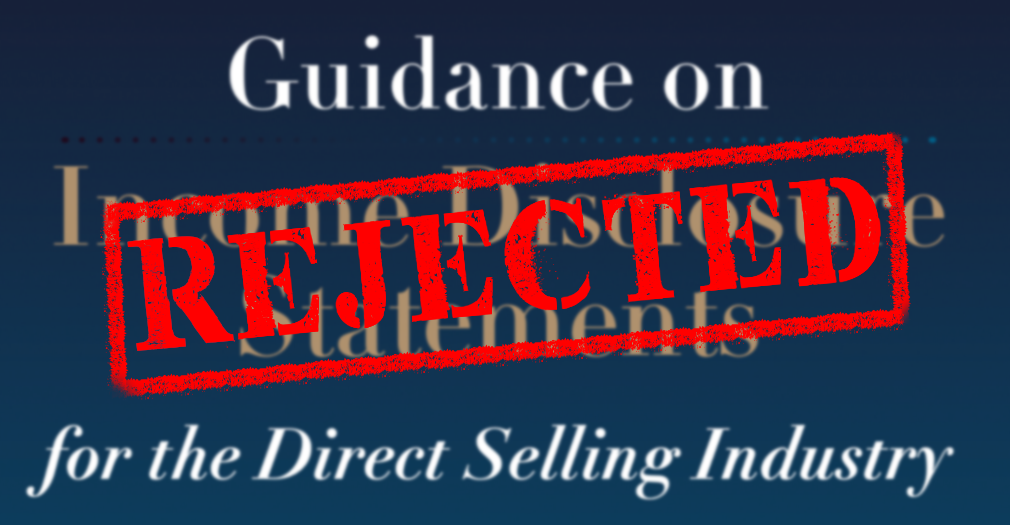
FTC Staff Urge MLMs Not to Rely on Industry Income Disclosure Guidance
Advisory opinion letter raises “serious concerns” with self-reg group’s guidance.
Whose responsibility is it to vet ads for fraud?
| Fran Silverman
In its effort to crack down on weight-loss scams, the Established in 1914 under President Woodrow Wilson, the FTC is the United States government’s primary regulatory authority in the area of consumer protection and anti-competitive business practices in the marketplace. Its Bureau of Consumer Protection assumes the lead in the Commission’s efforts to eliminate deceptive advertising and fraudulent business practices at work in the economy. earlier this month released a “gut check” guide for the media to help advertising managers spot scam ads and make sure they aren’t published or aired.
Fraudsters count on consumers thinking that an ad for a product or service must be legitimate when they see it on their favorite media site or in their local paper, the agency noted.
Said the FTC to the media:
Accuracy is your company’s stock in trade. Why sully your good name by being known as a publication or station that promotes rip-offs.
This is certainly an issue that resonates with readers. Just as the FTC was releasing its guide, TINA.org received a complaint from a reader about a newspaper in Arkansas that was printing ads for companies he said were selling suspect products. One such ad was for collectible coins from the World Reserve Monetary Exchange that has an “F” rating from the BBB.
Reader Larry K. told TINA.org:
My main concern is that the newspaper owes its readers at least a minimum inquiry of the accuracy of ads and especially of full-page ads. It only took me five minutes to Google these companies and their products to find numerous complaints, lawsuits and “F’ ratings by the BBBs. Newspapers owe their readers at least that much effort.
Larry said he tried to contact the advertising executives at the paper, the Arkansas Democrat-Gazette, and also complained to the Arkansas Attorney General. But he got nowhere on the issue. I tried to contact the advertising manager as well, several times. But no one from the paper got back to me.
Other media representatives say it’s a complicated issue, bound up in First Amendment issues, court rulings and the individual advertising policies of various media outlets.
Court rulings have stipulated that media outlets aren’t responsible for the content of ads unless they provide some kind of endorsement for the product or service itself. In fact some states have regulations that expressly state that media outlets aren’t responsible for the content of ads unless media staff had knowledge beforehand that the ads were false. That means that the more a newspaper does to vet an ad, the more responsibility it has to not run it if it’s deceptive. Said another way, the less they do to vet an ad, the less liable they are.
Paul Boyle, senior vice president of public policy for the Newspaper Association of America, told me that while the association works with the FTC to educate its members about false and deceptive ads, advertisers themselves have the ultimate responsibility for what they sell and how they sell it.
Said Boyle:
Newspaper advertising people are not doctors…Are they capable of making a determination of whether or not a claim is accurate or not in regards to the way it is phrased and (its) health effect? That is why we firmly believe the responsibility is on the advertiser and not the media.
The National Association of Broadcasters had a similar view. Dennis Wharton, who is its executive vice president, said:
You can’t expect every broadcaster in America – and there is something like 16,000—to have teams of researchers checking the scientific claims of every product…At some point you have to trust your listeners or viewers to have a truth meter embedded in their brain if an ad sounds too over the top…
Full disclosure: I am a member of the media and have worked for small and large newspapers, each with its own standards for ads. I know in this age of declining revenues and small staffs it can be tough for media outlets to vet all ads and even more so, turn income away. Still, I agree with the FTC. A media outlet’s reputation is on the line.
In a recent follow-up email, Larry said the Arkansas paper finally stopped running at least one ad that he was upset about. That ad was for a “free” telephone for seniors that actually ends up costing $97 after activation fees. He said the paper stopped running the ad after a local television station did a story about the ad and the company, Brilliant Built Technologies, which also has an “F” rating from the BBB.
So, readers, if you’ve been scammed by an advertisement, contact the media outlet and let them know. Tell them you will stop watching their station or paying for their newspaper. That’ll get their attention. And of course, let us know too. Because that’s exactly what we do here at TINA.org. We vet ads for accuracy.
Advisory opinion letter raises “serious concerns” with self-reg group’s guidance.
It may surprise you.
Why TINA.org supports FTC’s proposed changes to COPPA Rule but pushes for more.


